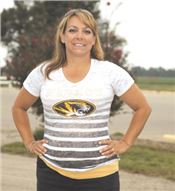|
Cotton Production Solutions Emerge

Andrea Jones, Missouri cotton specialist at Fisher Delta Research
Center in Portageville, recently discussed new developments
in cotton production.
Photo by John LaRose Jr.
BETTY VALLE GEGG-NAEGER
MidAmerica Farmer Grower
PORTAGEVILLE, MO.
Some new developments on the cotton production scene were presented recently by Andrea Jones, Missouri cotton specialist at Fisher Delta Research Center in Portageville.
“Right now there’s a lot of exciting things going on in cotton production,” she said. “First of all, the Enlist and Dicamba genes hopefully will be available next year, so if we could just get the cotton price up, there are many exciting developments emerging.”
Along with the Enlist and Dicamba, Bayer is coming out with their HPPD gene technology in the near future, and possibly in 2020 Monsanto may be releasing its Bt lygus trait.
“There is so much plant bug pressure here in the Missouri Bootheel with the normal an average of seven applications, so that trait would be a great benefit to the producer,” Jones added. “The Dicamba resistance varieties are just going to be extra tools making up a three-way approach – glyphosate, glufosinate and dicamba – to curb pests in cotton.
“We still fight pigweed here, it’s a terrible problem, so this is also going to be a great tool for the producers to use,” she added. “So if we could just get that price up, these are exciting times and companies are really putting a lot of money into research.”
At the University of Missouri Lee farm, research is underway on drift for the Enlist (2,4-D), and drift for Dicamba (Engenia), studying high rates and low rates on cotton to learn the damage rates at different stages. These plots are “show plots” for researchers, industry, and producers to learn what the drift looks like and the damage that drift causes at the different stages.
“I would say the variety trial is our most popular trial that we conduct,” Jones said. “We have eight trials in the Missouri Bootheel, primarily because we have such differences in soil types here. We try to have those variety trials on all the different soil types, so the eight are scattered through different counties in the Missouri Bootheel.”
She highlighted the nine varieties that performed really well in the trials.
• Phytogen has great varieties that topped the trials last year. Two of them are 312 and 333, both of which have the Widestrike gene.
• Bayer has two great varieties that fit well in the Missouri Bootheel and have performed well, those are 4747 and the 4946.
• Dynagro has variety 3385 and that one is the Xtendflex that has performed very well here also.
• Then Monsanto has two varieties that were outstanding here in 2014, the 1518 and 1522.
• Finally, the Americot varieties NG 3405 and 3406 perform well in the Bootheel also.
The 2015 varieties trial results are available now online at <aes.missouri.edu/delta>. ∆
BETTY VALLE GEGG-NAEGER: Senior Staff Writer, MidAmerica Farmer Grower
|
|